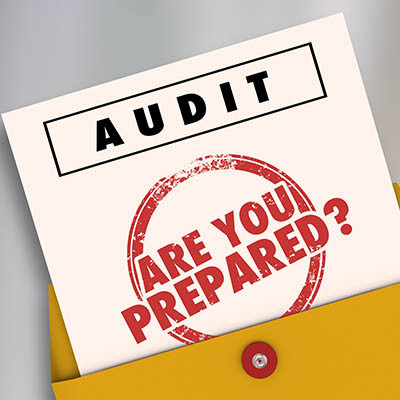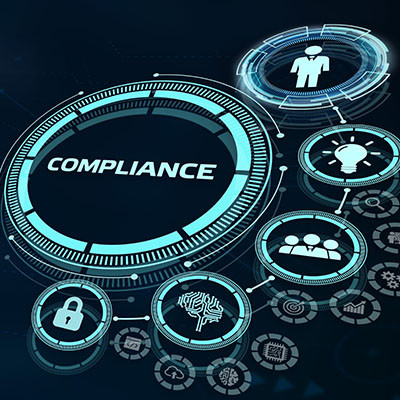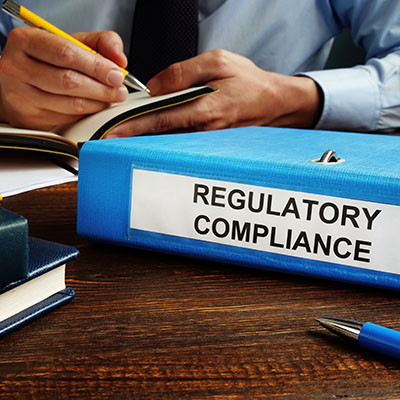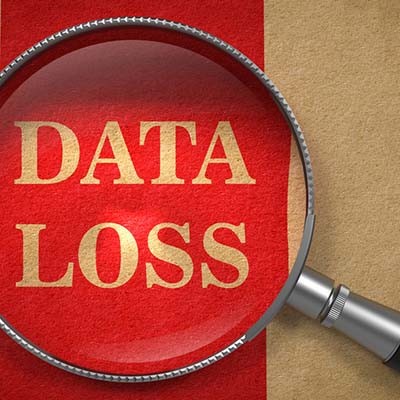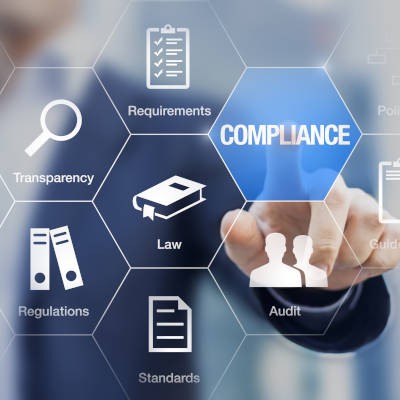For businesses, one of the scariest threats out there is that of compliance fines for not holding up your end of the bargain with your customers’ data. But what goes into compliance, and what does it look like? We won’t be digging into the nitty-gritty of what these specific regulations require; rather, we’re performing a broad analysis of what businesses should be doing to ensure compliance, regardless of the protocol or the industry.
The Connection, Inc Blog
Artificial intelligence, or AI, has upended the way that we discuss technology in business, society, and individual everyday life. While we mostly focus on the benefits of the technology, there are many downsides to consider as well. That’s what we’d like to discuss today; how AI has a dark side to it that potentially requires regulation.
Would you feel safe staying at a hotel that, instead of unique locks, each door used the same key as all of the others? Probably not—because if someone got in, they could take whatever they wanted. That’s similar to how old-school cybersecurity worked. Once someone got into a company’s network, they could access almost everything, making it easy for hackers to steal information. But today, many businesses use a better security framework called zero-trust security. In today’s blog, we discuss what zero-trust security is and why it’s safer.
While the word “audit” can easily be a scary thought for businesses, there are certain cases where an audit serves an organization’s direct benefit. Take, for instance, the ones that occur internally to identify and correct security issues and vulnerabilities. These audits are not only a positive endeavor for businesses; they’re extremely important to carry out.
Let’s talk about why this is and review a few standard practices you should prioritize as you go about this process.
Your business is likely subject to certain compliance laws and regulations depending on the type of data you collect from your clients or customers. Today, we want to emphasize the importance of your business considering regulation and compliance when managing its data and IT resources, as without doing so, you run considerable risk.
Perhaps predictably, the word “insure” has roots that tie it closely to “ensure,” as it is meant to ensure a level of security after some form of loss. Nowadays, that loss often pertains to data, making cyber insurance an extremely valuable investment for the modern business to make.
However, in order to obtain this kind of insurance, businesses commonly need to meet some basic requirements. Let’s go over some of these requirements now.
Cybersecurity is important. Scroll through a few pages of our blog and you’ll see article after article talking about threats and ways to make yourself and your business less vulnerable to cyberthreats. As an IT professional, however, I’d be so much happier if the state of the world didn’t require such a massive effort just to protect oneself and we could just talk about cool stuff you can do with modern technology all the time!
But alas, strong cybersecurity is crucial to virtually any organization, and it’s becoming even more important by the month.
When I was a kid, there was a Tex Avery cartoon where Droopy Dog was chasing down a crook who escaped from jail. There was a particular scene where the crook (I think it was a wolf in a black-and-white striped jumpsuit) takes a bus, a plane, a ship, and a taxi to a secluded cabin, and then closes a series of increasingly complex doors with a large number of locks, in order to hide away from the pursuing cartoon basset hound.
Of course, when he turns around, exhausted by all the effort he puts in, he realizes that Droopy is standing right behind him, and greets him with a monotone “hello.”
I haven’t seen this cartoon since I was 7 years old, but I almost always think about it when I am using multi-factor authentication.
The Health Insurance Portability and Accountability Act is a regulation passed by the US congress in 1996 to help streamline the healthcare system while maintaining individual ePI privacy over individuals’ health records. This regulation was put in place to allow people to transfer their health coverage, but also to minimize the risk individuals take on as far as fraud and abuse of their health records is concerned. This week we’d thought we’d discuss four ways your technology can help your organization keep its HIPAA compliance.
Cloud computing is a major growth industry as businesses and individuals look to use the computing strategy to either save money or get resources that they would typically not be able to commit to. With cloud computing becoming more and more integrated into business each year, it stands to reason that the once Wild West of cloud computing would start to see a lot more regulation. This week, we’ll take a look at how the cloud is regulated and what to expect out of cloud regulation down the road.
2020 was, obviously, a challenging year for healthcare providers. In addition to the obvious issue of the COVID-19 pandemic creating serious operational, financial, and supply chain difficulties, cybersecurity concerns didn’t go away during this time. Let’s consider some of the additional stresses that IT security needs can, will, and have placed on healthcare providers.
The days of the cash-only business are over. It doesn’t matter if your business is a multinational corporation or you cut grass for a living, accepting payment cards is not only convenient for your customers, most of the time it’s the most secure way to get paid. In an effort to protect the personal and financial information of consumers who have come to depend on their payment cards, the banks that back the credit card industry have developed a regulation that businesses who process cards need to adhere to. Today, we will go over this regulation and how it affects small and medium-sized businesses
Data loss can have lasting effects upon your business, usually measured in lost productivity and capital. In other words, data loss is often measured by the cost required to retrieve, restore, and/or repair its effects. Of course, this is only the beginning of how data loss can impact your operations.
Despite what detractors say, regulations are in place for good reason. They typically protect individuals from organizational malfeasance. Many of these regulations are actual laws passed by a governing body and cover the entire spectrum of the issue, not just the data involved. The ones that have data protection regulations written into them mostly deal with the handling and protection of sensitive information. For organizations that work in industries covered by these regulations there are very visible costs that go into compliance. Today, we look at the costs incurred by these organizations as a result of these regulations, and how to ascertain how they affect your business.
When we write about Net Neutrality, we typically write about how it is designed to keep the telecommunications conglomerates, who make Internet service available to individuals on the Internet, honest when laying out their Internet service sales strategy. One way to put it is that without net neutrality in place, the Big Four (which are currently Comcast, Charter, Verizon, and AT&T) have complete control over the amount of Internet their customers can access.
Most companies have some sort of regulation they need to stay compliant to, and 2020 seems to be a landmark year. This year, companies have to deal with end-of-life upgrades, the development of new privacy laws, as well as the existing regulatory landscape. Let’s take a look at why compliance is important and what to expect in the year ahead.
One of the inevitabilities of working with the cloud is that you have to face a tough question; what kind of compliance requirements are there for cloud-based data? If you’re storing data for your business in a cloud-based environment, it becomes your responsibility to know where and how this data is stored--particularly if you’re not the one doing the actual cloud hosting. How do you maintain compliance when you seemingly have so little control over how your computing platform is managed and maintained?
It all starts by asking your cloud provider specific questions about how compliance is handled, as well as what terms are written into the agreement that you have with them. We’ll go over some of the details that you’ll need to address.
The Cloud Can Be Tampered With
Naturally, one of the major concerns that businesses might have about cloud compliance is the idea of how this data is being managed, maintained, stored, and transferred. This also means that it can be changed or intercepted while it is in transit. Therefore, the key concern is that data could be changed without the user’s knowledge. Those who are concerned about the legal ramifications of this should focus on learning who is hosting the data, how it is being maintained, how it is being transported from the hosting site to your infrastructure, and who can see this data. This line is further blurred by the differences between the public and private cloud. In other words, is your data being stored alongside someone else’s data? Are there partitions put into place that limit access based on role and organization? The question of security is of the utmost importance and will be a major point that you’ll need to hit for compliance’s sake.
What Can You Do?
Using the above statements as a springboard, you’ll need to think about how your business plans on securing cloud-based data and ensuring its compliance with any regulations your organization is beholden to. You start by first assessing just how deep into cloud computing your organization actually is. Depending on the importance of certain data, you may decide that a combination of private and public cloud platforms present the ideal solution. For sensitive information, an internal network or private cloud is ideal, while less sensitive or important data is stored elsewhere.
Next, you’ll need to consider who is managing this data, and what kind of agreements you will have to make to guarantee its safety. Is it being managed by an in-house department or a third party? If it’s a third party, for example, you’ll need to determine responsibilities and consequences of failing to adhere to compliance guidelines. It’s also important that you know what types of security and backup solutions are being used to protect your assets.
Since your organizational reputation and integrity is on the line, your best bet is to find a way to design, deploy, and support a private cloud solution onsite for any data that could possibly be subject to regulatory compliance. Otherwise, you may find that any cloud-hosting company or colocation service won’t have your immediate needs top of mind.
The Connection, Inc can help your business ensure security of your cloud solutions. To learn more, reach out to us at (732) 291-5938.
Compliance laws regarding the storage and dispersion of healthcare records were implemented with the intended purpose of urging healthcare providers to better take care of their patients’ personal information, but how effective are they? Unfortunately, there are many providers that have failed to meet the standards for the HIPAA and HITECH compliance laws, and it has brought a hefty price tag along with it.
In 2016, the Office for Civil Rights (OCR) and the Department of Health investigated several data breaches that led to a considerable sum being claimed in response to violations of these compliance laws. In what totaled to 12 settlements following the investigations of data breaches caused by failure to comply with these laws, as well as one monetary civil penalty, these claims amounted to approximately $25,505,300 in fines.
Compare this to the more recent data. In 2017, there were only nine HIPAA settlements that produced a total of $19,393,000, as well as a single monetary civil penalty paid, a considerably smaller sum than the previous year. Clearly something is working here, but what is it? Perhaps it’s the fear that being negligent with important data could mean a large sum raining down on the heads of those who fail to adhere to these laws.
What’s even more interesting are the types of violations that led to these penalties. While the majority of these involve a failure to protect protected health information, or PHI, and its digital counterpart electronic protected health information (ePHI), there are a couple of outliers that are interesting to look at. Here are some of them:
- Insufficient ePHI access control
- Impermissible disclosure of ePHI
- Careless handling of PHI
- Multiple HIPAA violations
- Delayed breach notifications
- Lack of security management process
- Lack of a business associate agreement
The majority of the issues revolving around HIPAA and HITECH compliance come from an inability to secure mobile devices, failure to implement proper security processes, and delaying breach notifications for far too long.
As for HITECH specifically, a recent lawsuit was filed in federal court against 60 hospitals over alleged failure to adhere to the HITECH Act. Specifically, these hospitals failed to adequately provide records and documentation for 50% of their patients within three business days of the request. This is one of the specific requirements for securing funding through the HITECH Act, so you can understand that this was quite a big red flag for government.
Consequently, these 60 hospitals from the state of Indiana now face charges totaling over $1 billion for failure to provide records as required, despite receiving the incentive payments totaling around $324 million. Additionally, these hospitals face claims that they violated the Anti-Kickback Statute and the False Claims Act for claiming that they were HITECH-compliant, when in reality they failed to meet the requirements of the regulation.
Not all practices fail to adhere to HIPAA and HITECH, though. Is your practice one of them? Answer with confidence today by reaching out to The Connection, Inc at (732) 291-5938.
Technology is invading all practices, including those of medical offices and other health-related institutions like hospitals and dental offices. With the advent of electronic medical records (EMR) and their management systems, medical institutions are capable of eliminating the physical space required to store paper documents, and can instead easily store them in a digital environment. Unfortunately, this also brings its fair share of problems, such as regulatory compliance.
In other words, offices that don’t take steps to adapt to these changing industry standards could be hit with compliance fines that break their budget. If your office doesn’t take precautions to meet the various regulations put into place by HIPAA, HITECH, PCI, and other laws, and if the personal information for your office’s patients is stolen by hackers, your business could be charged somewhere between $100 to $50,000 per record. You don’t need us to tell you that this is an immense cost that’s exceptionally crippling.
To help you keep your office in compliance, we’ve outlined some information about the various laws that you’ll need to know about.
HIPAA
Known as the Health Insurance Portability and Accountability Act of 1996, HIPAA is a set of compliance regulations that are designed to enforce electronic medical record privacy for patients. HIPAA covers, more or less, all healthcare organizations, the medical staff, and employees of the healthcare industry. This includes health insurance providers. Basically, HIPAA is designed to provide those who submit electronic medical records with rights to know how their information is being used and stored within the electronic medical record environment, and to ensure that health records and personal information is stored in accordance to the various security aspects of HIPAA.
HITECH
The Health Information Technology for Economic and Clinical Health Act was first introduced in 2009, and was designed to encourage medical practices to adopt technical solutions to their operational advantage. Specifically, HITECH revamped part of how HIPAA views user privacy. HITECH requires that organizations covered by HIPAA report data breaches of 500+ users to the United States Department of Health and Human Services, the media, and to the users affected. Furthermore, it changes the way that organizations handle the disclosure of electronic medical records, as well as how this information is used throughout the caregiving process.
PCI DSS
The Payment Card Industry Data Security Standard (PCI DSS) is a set of security standards that must be met before an organization can choose to implement major card-scanning technology systems. As credit card numbers are one of the hottest targets that hackers gun for, the main goal of PCI is to minimize and prevent credit card fraud. This applies to any organization, regardless of industry or product, that allows transactions to be completed with cards. Some examples of required protocol include maintaining a firewall that protects cardholder data, restricting access to card numbers on a “need-to-know” basis, and tracking and monitoring network resources, including what accesses cardholder data.
Compliance regulations can be difficult to understand if you’re not versed in the specifics. The Connection, Inc can help your business ensure compliance with the various laws so you don’t wind up in a situation that spells trouble for your organization. To learn more, give us a call at (732) 291-5938.





